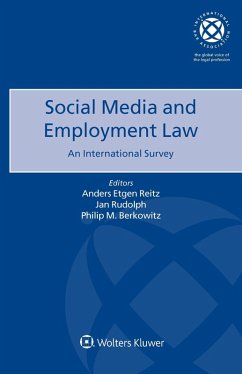
What Future for Social Security? (eBook, PDF)
Debates and Reforms in National and Cross-National Perspective
Redaktion: Clasen, Jochen

PAYBACK Punkte
58 °P sammeln!
It is widely assumed today that the `welfare state'' is contracting or retrenching as an effect of the close scrutiny to which entitlement to social security benefits is being subjected in most developed countries. In this book fifteen authorities from nine different countries - the UK, the Netherlands, France, Germany, Spain, Denmark, Finland, Norway, and the US - investigate to what extent this assumption is warranted. The papers were originally presented at a Conference on `The Future of Social Security'' held at the University of Stirling in June 2000. Taking into account developments and ...
It is widely assumed today that the `welfare state'' is contracting or retrenching as an effect of the close scrutiny to which entitlement to social security benefits is being subjected in most developed countries. In this book fifteen authorities from nine different countries - the UK, the Netherlands, France, Germany, Spain, Denmark, Finland, Norway, and the US - investigate to what extent this assumption is warranted. The papers were originally presented at a Conference on `The Future of Social Security'' held at the University of Stirling in June 2000. Taking into account developments and initiatives at every administrative level from sub-national employment agencies to the OECD and the World Bank, they draw on both data and theories in a broad spectrum of related disciplines, including political science, economics, sociology, and law. Detailed materials allow the reader to formulate well-defined responses to such crucial questions as: Is there indeed waning public support for social security? Is the ''demographic time bomb'' of an ageing population as serious a problem as we are often led to believe? How seriously do supranational reform proposals tend to underestimate cross-national differences? To what degree is `activation policy'' merely rhetorical? To what extent do employment office staff reformulate and redefine policies `on the ground'' to accommodate specific case-by-case realities? Specific criteria for entitlement (e.g., disability) and such central issues as `gendered'' assumptions, access to benefit programmes, and the involvement of trade unions are examined in a variety of contexts. As an authoritative assessment of the current state of social security reform - its critical issues, its direction, and its potential impacts - What Future for Social Security? is an incomparable work, and is sure to be of great value to all professionals and officials concerned with social programmes at any government level.
Dieser Download kann aus rechtlichen Gründen nur mit Rechnungsadresse in A, B, BG, CY, CZ, D, DK, EW, E, FIN, F, GR, HR, H, IRL, I, LT, L, LR, M, NL, PL, P, R, S, SLO, SK ausgeliefert werden.













